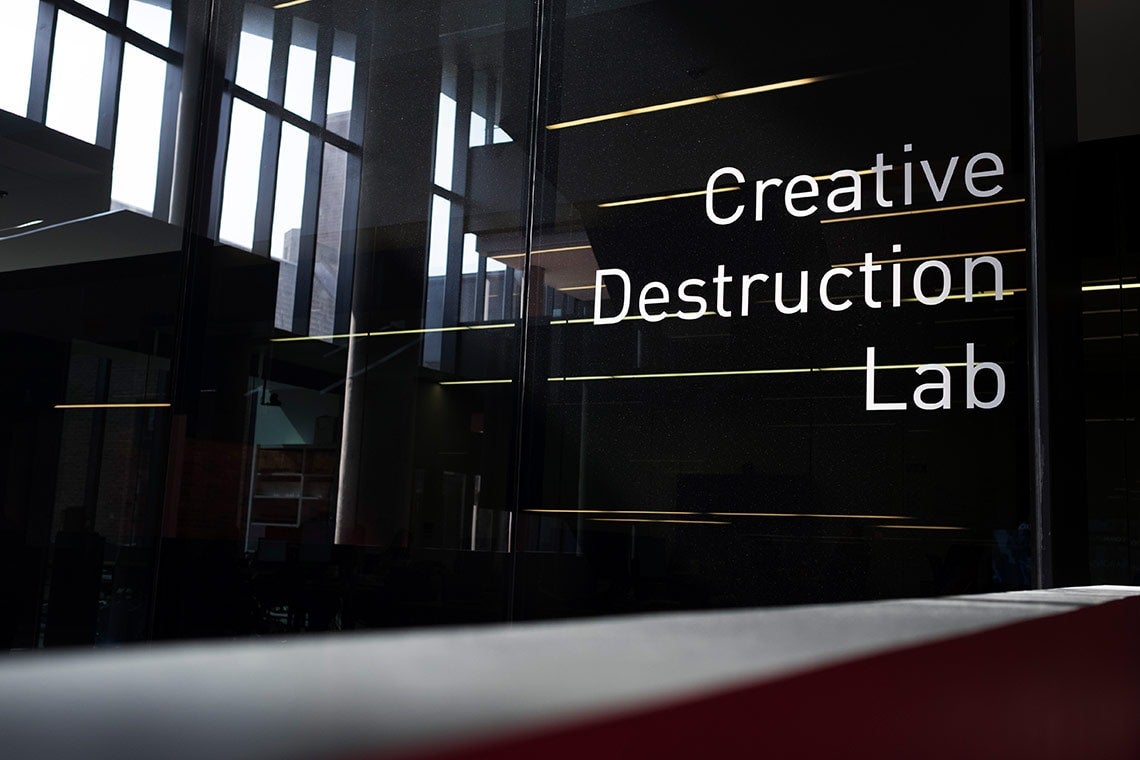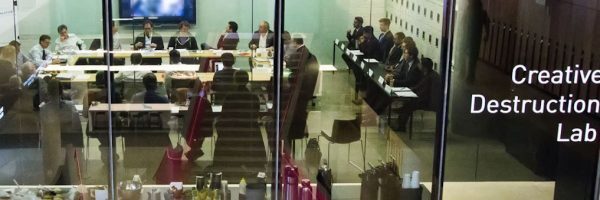5 Questions With Imran Kanga, Rotman’s MBA Director of Admissions

In our latest installment of the MetroMBA “5 Questions” series, we speak with Imran Kanga, Director of Recruitment & Admissions of the full-time MBA program at the Toronto Rotman School of Management. Kanga discusses what students should know before applying and the culture of the program.
What type of MBA student flourishes at Rotman?

Imran Kanga, Director of Recruitment & Admissions of the full-time MBA program.
“Students who flourish in the Rotman full-time MBA program are highly driven and motivated individuals who have demonstrated leadership potential and academic excellence in their prior work and education. Our students also demonstrate excellent communication and interpersonal skills and thrive in a team environment, which not only is a significant part of the program but also sets them up for success in the workplace after graduation.”
What should prospective students know about the Rotman MBA program before they apply/start?
“The Rotman MBA program is a big commitment, both in terms of time and money. I would encourage prospective students, before they apply or start the program, to thoroughly research the program, the university, the city, and the career opportunities that potentially await them. It is important for them to speak to faculty, alumni, our career coaches, current students, and also the admissions team to understand what the requirements are and what they can expect from the program.
The FT MBA program is extremely rigorous and demanding, but it is also a very rewarding experience, and students need to be prepared before starting the program.”
What makes Rotman stand out amidst other Canadian MBA programs?
“There are so many factors that distinguish the Rotman MBA from other Canadian programs. To focus on a few…
- Being part of Canada’s largest and top-ranked University, Rotman MBA students enjoy the benefits of not only all the resources that the business school offers but also the University of Toronto as a whole. This includes being part of an extended global alumni network and a strong brand that is globally recognized.
- Our location in the heart of the largest city in Canada gives our students unfettered access to the largest business network in the country.
- Rotman also has some unique labs such as the Creative Destruction Lab, which supports startups in technology and disruptive innovation to scale and also gives our students the opportunity to work with these companies. Our one of a kind Self-Development Lab uses advanced technology and analytics to help students improve their soft skills such as communication, negotiation and presentation skills.”
How would you describe the culture of Toronto Rotman?
“The culture at Rotman is very much student success driven. Faculty, staff, alumni, and various other stakeholders work closely with students throughout their MBA journey to ensure that they are set up for success both during and after the MBA program.
At Rotman, we are also extremely committed to diversity and inclusion. Our students are extremely diverse, coming from all over the world and have different education and work backgrounds, which fosters a culture of knowledge sharing, support, and collaboration.
Our Dean Tiff Macklem is focused on continuous improvement, innovation, thought leadership, and research excellence, which is also central to Rotman’s culture.”
Where is your favorite place to visit in Toronto? Why?
“As a foodie, my favorite area of Toronto is the downtown core, which has a wide variety of restaurants and cuisines from all over the world, owing to the city’s incredibly diverse population.”
U. Toronto Invests in Rotman Innovation, Data, and Entrepreneurship

Innovation, entrepreneurship, data, and analytics all play significant roles at the University of Toronto’s Rotman School of Management. As a global center for research and academic excellence in business and society, Rotman is known for bringing together diverse views and initiatives. So, it should be no surprise that this month the Rotman School announced increased investment, from different sources, in three areas:
- $25 million in funding for the Creative Destructive Lab (CDL)
- $4 million in new funding for data and analytics initiatives
- $2.5 million to the Creative Destructive Lab Health Stream and additional financial resources in support of the Behavioral Economics in Action at Rotman (BEAR) research center.
Creative Destruction Lab Receives $25 Million

Founded in 2012, the Creative Destruction Lab (CDL) was created to address failure in the market for judgment. As a seed stage program, its goal is to help science-based companies become scalable by pairing founders with experienced entrepreneurs and investors. The nine-month program covers everything from commercialization of products to R&D and maximizing equity-value creation.
To increase the CDLs ability to help young companies, the Canadian government announced a $25 million investment in the program. The investment will allow the CDL to accelerate the commercialization of science in Canada while hopefully also attracting more investment in ventures and more intellectual property. Over four years, the CDL will help more than 1,300 science-based ventures and could create up to 22,000 new jobs.
In a recent press release, Minister Bains says:
“Creative Destruction Lab’s exciting project promises to unleash a new wave of start-up innovation across Canada, creating thousands of middle-class jobs and further securing Canada’s position as a world leader in the AI field. Our government is proud to make investments that will help turn hundreds of innovative ideas into the good jobs and companies of tomorrow.”
The investment will also help the CDL gain insight into the success of science-based startups. In particular, ventures harness new technologies such as AI, energy, health, smart cities, and space and quantum technologies will be targeted. There will also be a boost for young women in science, technology, engineering, and math (STEM) fields in the hopes of inspiring representation in the next generation of business leaders.
“This is a tremendous moment,” Tiff Macklem, Dean at the Rotman School, says. “Thank you Minister Bains, the Government of Canada and everyone that saw the vision and opportunity of the Creative Destruction Lab.”
The investment was made through the Strategic Innovation Fund; a program focused on attracting and supporting high-quality business investments across all sectors of the economy.
$4 Million for Data and Analytics

Data and analytics are an essential area of study at the Rotman School as evidenced by the launch of the new Master of Management Analytics (MMA) program as well as the TD Management Data and Analytics Lab. So, it makes sense that when the TD Bank Group (TD) was looking for a way to support the Rotman School, they decided to give $4 million in funding to explore real-world data and analytics applications.
Christian Nelissen, TD Senior Vice President of Enterprise Data and Analytics, says in a news release:
“Data and analytics are the engines powering the future of Canada’s economy. That new reality means building talented teams that have a deep understanding of the potential of data and analytics, in financial services and beyond. We are looking for visionaries who can see what’s possible—things we might not even have thought of yet.”
Specifically, the funding will go toward development and staffing of the TD Management Data and Analytics Lab, which launched in 2017. The goal of the investment is to improve student development and engagement in data and analytics, and to add expertise and resources for industry projects and cutting-edge analytic thinking. The Lab also offers workshops, hackathons, guest speakers, academic collaboration, and seed funding for the Rotman FinHub.
“By collaborating with TD, we are giving students the opportunity to engage in data-focused problem-solving,” Dean Macklem says. “We know our students are eager to take on new roles in the evolving field of data and analytics and this generous investment will allow us to move more quickly to further expand our data analytics programming and opportunities.”
Investing in Healthcare Innovation & Behavior Economics

Last, but certainly not least, TD Bank Group announced additional investments in two initiatives: innovation in healthcare and behavioral economics.
The first investment from TD is $2.5 million over five years for the Creative Destruction Lab Health Stream, which focuses on biotechnology, bioinformatics, diagnostics, and digital care. This investment will help aspiring entrepreneurs bring technological innovations to the market in the healthcare industry.
Andrea Barrack, TD’s Vice President of Global Corporate Citizenship, says:
“We know that the long-term success of our business depends upon the resilience and health of the people we serve. We’re thrilled to support the CDL with this contribution, which will help accelerate advances in healthcare through fresh thinking and entrepreneurship. At TD, we have a history and meaningful purpose of helping to enrich the lives of customers, colleagues and communities.”
The second investment from TD comes in the form of an agreement to bring additional behavioral finance resources and applications in support of the Behavioral Economics in Action at Rotman (BEAR) research center. As a founding member of BEAR, TD hopes to be able to better examine and research the underlying emotion and behaviors that push financial decision making. Also, the investment will help continue to implement behavioral finance tools into wealth management.
“Being one of the founding members of BEAR will further contribute to TD’s commitment to advancing the study and real-life applications of behavioral finance,” says Dave Kelly, Senior Vice President of TD Wealth. “The work we have done to-date with Rotman has been instrumental in enhancing the advice and services our advisors provide to our clients. Research by BEAR will enable us to better understand the underlying factors that help drive financial decision making so we can connect with our clients on a deeper, more meaningful level.”
The End of Non-Compete Clauses, and More – Toronto News

Representatives from some of Toronto’s strongest business schools have made many contributions to help better their communities this week. Check out some best stories from the week.
Restaurant Brands International to Review ‘No-Poach’ Franchise Agreements – Vancouver Courier
Restaurant Brands International, one of the largest global quick service restaurant companies, indicated that it may be re-thinking the ‘no-poach’ clause in employee contracts. ‘No-poach’ clauses (also known as non-compete clauses) prevent employees from one franchise location from moving to different competing franchise location within the same chain. Experts, including Maurice Mazerolle, Associate Professor at Ryerson University’s Ted Rogers School of Management, believe the clause prevents wage growth for people working in this field.

Restaurant Brands International, which operates Canadian-mega chain Tim Horton’s, may be ditching its “no-poach” clause for its employees.
“In theory, in a tight labour market it basically means you’re not going to be able to bid up wages to compete for those experience workers,” Mazerolle said in an interview with the Vancouver Courier.
Restaurant Brands International owns Canada staple Tim Hortons, as well as Burger King and Popeyes Louisiana Kitchen, with franchises in the U.S. and Canada. Representatives from the fast-food giant have said that they will be consulting their franchisee advisory boards to discuss changing the ‘no-poach’ clause in employee contracts.
You can read more about ‘no-poach’ franchise agreements here.
Medicine by Design and Creative Destruction Lab Partner to Accelerate the Commercialization of World-Class Research in Regenerative Medicine – Medicine by Design
Creative Destruction Lab (CDL), a seed-stage program for science and tech companies that was launched University of Toronto’s Rotman School of Management in 2012, has partnered with Medicine by Design to support the monetization of and nationwide access to regenerative medicine. CDL Executive Director Sonia Sennik said:
“The Creative Destruction Lab has a strong history of supporting health-based companies, and we are very excited to deepen this area of focus through our Health Stream. By partnering with Medicine by Design, we can expand a successful model to include companies on the cutting edge of cell therapy and regenerative medicine.”
Medicine by Design’s regenerative medicine initiative perfectly complements the CDL’s commitment to providing resources for health innovators. The CDL has locations in Vancouver, Calgary, Montreal, Halifax, and New York City.
Read more about the partnership here.
Recycling Provides Manufacturers With Economic Advantages, Study Say – Indiana University
Gal Raz, associate professor at Western University Canada’s Ivey Business School, and Gilvan C. Souza, professor at Indiana University’s Kelley School of Business, co-authored a study that appeared in Production and Operations Management. In the study, “Recycling As A Strategic Supply Source,” the researchers investigated how recycling could provide lucrative resources for companies in today’s changing supply market. The researchers found that recycling can prove to be a wise fiscal decision for companies in the metal cutting tool and inserts industry.
“Because you become your own supplier—you sell your products and you collect them and you recycle them—it gives you your own source of raw materials,” Souza said. The professors’ research showed that recycling can protect companies from changes in the market. According to Souza, recycling “insulates you from the volatility of the market, at least partially. You’re still buying some portion of your raw materials from the commodity market, which is volatile, but if that’s a smaller and smaller portion, then that’s a significant benefit.”
Read more about the recycling study here.
What are the Best Healthcare MBA Degrees in Toronto?

The Toronto metro is not only home to a number of the finest business schools in Canada—it is is one of the top cities in North America for healthcare and human health sciences. According to the City of Toronto, the city’s life sciences sector employs nearly 30,000 professional and contributes more than $2 billion to the local economy. In a word, Toronto healthcare is huge.
How Toronto Schools Can Help You Pay for Your MBA

Earning your MBA can be an expensive prospect. In Canada, tuition at the most expensive MBA programs can cost more than $100,000 for full-time and part-time students. This can be difficult for some low-income applicants.
So, what are some Toronto schools doing to help offset the cost of tuition, living, and other expenses to pay for your MBA? Continue reading…
Inside the University of Toronto’s Creative Destruction Lab

The Creative Destruction Lab (CDL) at the University of Toronto Rotman School of Business is a seed-stage program created exclusively for scalable science-based companies. Launched in 2012, this program employs objectives-based mentoring to help maximize equity value creation for its ventures. The lab is best suited for early-stage companies, particularly those with links to university research labs.
The Creative Destruction Lab Program
The CDL is a nine-month program that employs a coaching process to help business founders commercialize their advances in science and technology. There are four main elements of the program:
- Mentorship: The founders work alongside select entrepreneurs and angel investors in intensive full-day sessions to assess their business progress and to set short-term objectives.
- Investment Opportunities: Founders have the chance to raise capital in meetings with entrepreneurs, angel investors, and partners from leading venture capital firms.
- Technical Feedback: The founders receive advice on their technical road maps and objectives from world-renowned experts at leading academic institutions.
- Business Development Support: Finally, the founders are able to work with MBA students to develop their financial models, evaluate potential markets, and fine-tune their strategies for scaling.
“The breadth and depth of insight that we were given access to was phenomenal,” said participant Karl Martin, founder of Nymi, a wearable technology firm in the healthcare space.
CDL Locations
Unlike many seed-stage programs, CDL has centers in five locations across Canada. Each location focuses on a specific stream of ventures and offers specific resources.
- Calgary: Working with the Haskayne School of Business, the Calgary location focuses on a few key research pillars including energy innovations, human dynamics, engineering solutions for health, new earth-space technologies, and other areas.
- Halifax: The Halifax location leverages the Rowe School of Business at Dalhousie University and fosters “blue-green” technology—focused on agri-tech, bioproducts, and environmental technology—and “prime” technology, including startups tackling problems in healthcare, finance, energy, chemical, media, transportation, and agriculture.
- Montreal: In partnership with HEC Montréal, the Montreal location focuses on startups using artificial intelligence and data analysis technologies.
- Toronto: The main location in Toronto, run alongside the Rotman School of Management, focuses on three types of startups. The first is “Prime” startups tackling problems in healthcare, finance, energy, chemical, media, transportation, and agriculture. Meanwhile, Quantum Machine Learning startups are grounded in physics, math, statistics, machine learning, electrical engineering, and/or quantum computing. Finally, massively scalable Artificial Intelligence/Machine Learning startups focus exclusively on artificial intelligence and machine learning.
- Vancouver: Located in Vancouver, this location operates in partnership with the Sauder School of Business at the University of British Columbia. It focuses on startups in the “Prime” stream as well as those in BioMedTech, including chemical, biological, and medical ventures.
Partnership with NYU Stern to Expand CDL to New York
And, beginning on September 1, 2018, the Creative Destructive Lab will partner with the NYU Stern School of Business to establish its first lab outside of Canada. The newest location will bring Stern faculty and MBA students alongside angel investors, serial entrepreneurs, and founders of pre-seed stage startups in science and technology. CDL New York will begin accepting applications in January 2018 and expects to admit around 25 ventures the first year.
“Our model for developing massively scalable science-based ventures has proved successful in Canada. And we anticipate it will be similarly successful for our partners at NYU,” said Ajay Agrawal, a Rotman entrepreneurship professor and the founder and academic director of the lab, in a recent news release about the expansion.
New Program Executive Director
In other news, Rotman chose Sonia Sennik to be the inaugural executive director of the Creative Destruction Lab and its national network of programs. Sennik will be responsible for the lab’s oversight and coordination as well as its strategic operational and programmatic leadership.
As a recent graduate of Rotman’s Executive MBA program, Sennik is uniquely positioned for her new role. She was the inaugural recipient of the Rotman Social Impact Award and excelled in leadership during her time in the program. She’s also held senior project and engineering management roles at HATCH, a global engineering consultancy.
Of Sennik’s appointment, Agrawal said in a news release: “The Creative Destruction Lab is expanding rapidly, both geographically and programmatically. Sonia will provide leadership, vision, and energy to help ensure the success of the Lab and its ventures in the coming years.”
Graduates of CDL
Over the years, the Creative Destructive Lab has had many graduates, including:
- Thalmic Labs (Waterloo): Thalmic Labs develops revolutionary wearable technologies that explore the future of human-computer interaction.
- Atomwise (San Francisco): Atomwise is a Deep Learning technology designed for novel small molecule discovery to help develop better medicines faster.
- Deep Genomics (Toronto): Deep Genomics creates life-saving genetic therapies including a biologically accurate data- and AI-driven platform that supports geneticists, molecular biologists, and chemists.
- Kyndi (Palo Alto): Kyndi incorporates advanced artificial intelligence and symbolic natural language understanding to help knowledge workers process and consume vast amounts of information in order to better make critical decisions.
- Heuritech (Paris): Heuritech bridges the gap between social media and commerce with cutting-edge deep learning technology that detects emerging product buzzes online.
To learn more about the Creative Destructive Lab, including information about applying, visit the main CDL website.
